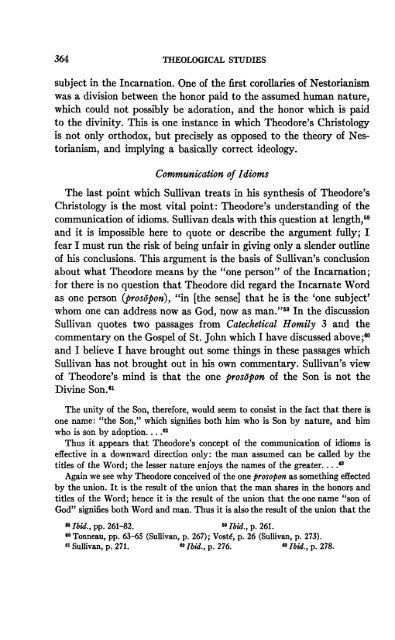ANNOTATIONS ON THE CHRISTOLOGY OF THEODORE OF ...
ANNOTATIONS ON THE CHRISTOLOGY OF THEODORE OF ...
ANNOTATIONS ON THE CHRISTOLOGY OF THEODORE OF ...
You also want an ePaper? Increase the reach of your titles
YUMPU automatically turns print PDFs into web optimized ePapers that Google loves.
364 <strong>THE</strong>OLOGICAL STUDIES<br />
subject in the Incarnation. One of the first corollaries of Nestorianism<br />
was a division between the honor paid to the assumed human nature,<br />
which could not possibly be adoration, and the honor which is paid<br />
to the divinity. This is one instance in which Theodore's Christology<br />
is not only orthodox, but precisely as opposed to the theory of Nestorianism,<br />
and implying a basically correct ideology.<br />
Communication of Idioms<br />
The last point which Sullivan treats in his synthesis of Theodore's<br />
Christology is the most vital point: Theodore's understanding of the<br />
communication of idioms. Sullivan deals with this question at length, 68<br />
and it is impossible here to quote or describe the argument fully; I<br />
fear I must run the risk of being unfair in giving only a slender outline<br />
of his conclusions. This argument is the basis of Sullivan's conclusion<br />
about what Theodore means by the "one person" of the Incarnation;<br />
for there is no question that Theodore did regard the Incarnate Word<br />
as one person (prosopon), "in [the sense] that he is the 'one subject'<br />
whom one can address now as God, now as man." 69 In the discussion<br />
Sullivan quotes two passages from Catechetical Homily 3 and the<br />
commentary on the Gospel of St. John which I have discussed above; 60<br />
and I believe I have brought out some things in these passages which<br />
Sullivan has not brought out in his own commentary. Sullivan's view<br />
of Theodore's mind is that the one prosopon of the Son is not the<br />
Divine Son. 61<br />
The unity of the Son, therefore, would seem to consist in the fact that there is<br />
one name: "the Son," which signifies both him who is Son by nature, and him<br />
who is son by adoption... , 62<br />
Thus it appears that Theodore's concept of the communication of idioms is<br />
effective in a downward direction only: the man assumed can be called by the<br />
titles of the Word; the lesser nature enjoys the names of the greater... . 63<br />
Again we see why Theodore conceived of the one prosopon as something effected<br />
by the union. It is the result of the union that the man shares in the honors and<br />
titles of the Word; hence it is the result of the union that the one name "son of<br />
God" signifies both Word and man. Thus it is also the result of the union that the<br />
58 Ibid., pp. 261-82.<br />
M Ibid., p. 261.<br />
fl0 Tonneau, pp. 63-65 (Sullivan, p. 267); Vost€, p. 26 (Sullivan, p. 273).<br />
61 Sullivan, p. 271. «Ibid., p. 276. « 3 Ibid., p. 278.
















